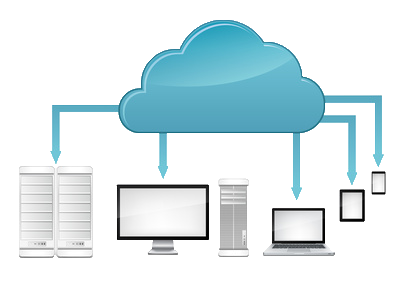What is a Cloud ERP Software?
An introduction to Cloud ERP solutions
Cloud ERP is an approach to Enterprise Resource Planning (ERP) that makes use of Cloud Computing platforms and services to provide a business with a more flexible business process transformation.
At Leverage Technologies, we like to think of Cloud ERP and Cloud Accounting Software as tools that help small and medium businesses drive profitable growth, increase employee engagement and boost customer satisfaction. Our suite of business solutions are designed specifically with that goal in mind.
For many businesses the biggest investments they make are in human resources, inventory and fixed assets and managing those resources are what ERP is all about.

Why Cloud Computing Matters
Cloud-based ERP benefits customers by providing application scalability and reduced hardware costs. In addition, Cloud computing technology made it easier for Leverage Cloud Technologies to deliver our ERP through a Software as a Service (SaaS) model for customers who want to acquire cloud ERP and not have to manage hardware, software, and upgrades while reducing up-front expenses.
Customers can build an internal cloud to reduce ongoing hardware costs while maintaining greater control over integration and require local access to their data server.
How Cloud-based ERP solutions work
Empowering your people, taking control of your business and playing to your strengths are the core areas where the Cloud ERP suites of MYOB Acumatica (formerly MYOB Advanced) business applications implemented and enhanced by Leverage Technologies can help your organization grow profitably. Our ERP consulting and implementation services allow your people to work anywhere, anytime, on any device via web browser-based accounting, inventory management, CRM and financial management applications.
Whether you choose to use Apple iPad, iPhone or Google Android platforms – Windows, Mac or Linux desktop platforms, Cloud-based ERP solutions such as MYOB Acumatica (formerly MYOB Advanced) can run on any or all of these – giving you the power of choice and allowing your business and your people to take advantage of BYOD (Bring Your Own Device) initiatives whilst keeping your data secure and protecting the privacy of your data and your customer’s data.
Definition of Web-Based Software: Use of a browser (thin client) to access a software application over the Internet (or intranet) to perform work.
By using web-based software, customers receive many benefits that are not inherently part of The Cloud. By eliminating client software, customers save time and money on installation and maintenance. In addition, the web delivers access from any device on any platform without expensive and complicated VPN and remote access software. Finally, web-based solutions such as MYOB Acumatica (formerly MYOB Advanced) from Leverage Cloud Technologies are managed from a central data store to guarantee that users can access real-time data and dashboards from anywhere. The benefits of web software are especially significant when companies have multiple locations or companies.
Hosted “Clouds”
When vendors place legacy software on a hosted virtual server such as Citrix or Windows Terminal Server, they claim to have a “cloud-based ERP solution.” But without web-based software, customers receive very few of the benefits described here. The presence of a thick client often requires longer installation times, dispersed data, client upgrades, and complicated remote access software not to mention additional license costs. When looking for cloud ERP software, make sure that it is web-based!
Vendors and advocates have introduced terminology and requirements which have been disputed as a source of being a true cloud environment.
- Multi-tenancy– Some cloud ERP vendors argue that multiple users must share the same software in order to qualify as a cloud application. SaaS companies argue that they can reduce the cost of upgrades and product updates by running this type of infrastructure. Multi-tenancy can occur at the infrastructure level, platform level, or application level. The trade-off between flexibility and cost easily justifies a multi-tenant infrastructure and a multi-tenant platform. Multi-tenancy only makes sense at the application layer if the cost of software is low compared to the need for flexibility.
- Internal clouds– A large corporation can own a server with as many servers as a cloud data center. In this case, it’s difficult to argue that a cloud cannot be internally hosted. However, if a company has only one server, the ability to add capacity would be limited and the NIST definition of the cloud could be challenged. Between these two extremes, there is a gray area where experts argue over whether an internal deployment can be considered a cloud.
- Hosted versus cloud– Hosting is another way to outsource IT operations. As described above, hosting is only effective if the software does not contain any client components
Leverage Cloud Technologies offers multiple solutions with different hosting and licensing options so that you can choose the model that works best for your business.
- SaaS: A subscription license for MYOB Acumatica (formerly MYOB Advanced) hosted in the Amazon Web Services public cloud.
- Private Cloud Subscription: A subscription license for a Leverage Cloud Technologies solution hosted in a private cloud with the hosting provider of your choice.
- Private Cloud Perpetual: You own the license for a Leverage Cloud Technologies solution hosted in a provided cloud with the hosting provider of your choice.
The use of the term “Cloud” includes a broad set of applications and software deployment models, namely Software-as-a-Service or SaaS.
After compiling several online resources, we created a generally accepted definition of cloud computing.
Definition of Cloud Computing: Use of the Internet to access hardware, software, and other resources that are provided on-demand in order to perform work and other business processes.
A more in-depth definition of cloud computing has been provided by the National Institute of Standards (NIST). Despite this work, disputes over multi-tenant, internal clouds, and cloud infrastructure versus cloud application create conflicting opinions of cloud requirements.
The bottom line is that ERP software that is deployed in a cloud environment becomes “Cloud ERP Software”. Most (if not all) Cloud environments are built using virtualization and load balancing technology that allows applications to be deployed across multiple servers and database resources.
It’s all about helping you play to your strengths and more importantly, empowering your people to help unlock your business potential.
More importantly, however is that Cloud ERP is a flexible and cost-effective option for small and medium-sized businesses and offers extensive benefits for growth and expansion:
- Freedom to scale and grow: Lowers businesses’ total costs and flat-fee prices
- Freedom from IT constraints: Offers high-level security and privacy, easy accessibility and integration
- Freedom from lock-in: With your data in the cloud, you can move it at any time
- Freedom to innovate: Offers continuous new features and functions
Leverage Technologies can get you started with a right-sized ERP solution. To learn how you can benefit, view our Product Editions page. We offer three standard product editions that offer flexibility and choice in helping you select the Leverage Technologies solution that best fits your needs.

On-Premise vs Cloud ERP Deployment
How can a Cloud ERP system help your business grow?
From managing your business’ finances to streamlining your operations and providing better customer insights. Cloud-based ERP software gives you the modules and functionalities to better control your organisation and lay the foundations for growth.
Finance
ERP Finance ModuleFinancial Management
Helps you leverage advanced financial reports and management functionalities.
Accounting
ERP Accounting ModuleAccounting Management
Helps you centralise your Accounting, cash management, invoicing and payments.
Operations
ERP Operations ModuleOperations Management
Align operational activities with business strategy to deliver better outcomes.
Human Resources
ERP HR ModuleHR Management
HR module helps you better manage your most valuable asset.
Customer Management
ERP Customer Management ModuleCustomer Management
Leverage integrated CRM, Marketing and reporting dashboard to better serve your customers and tap into new revenue generating channels.
Project Management
ERP Project Management ModuleProject Management
Integrated cost tracking, project billing, scheduling and reporting help you keep your business on track.
Inventory
ERP Inventory Management ModuleInventory Management
Inventory and distribution management helps you streamline your sales and ordering process with ease.
Business Intelligence
ERP Business IntelligenceBI Management
Uncover new patterns and opportunities to streamline key areas of your business, improve efficiencies and generate more revenue.


Recent Comments